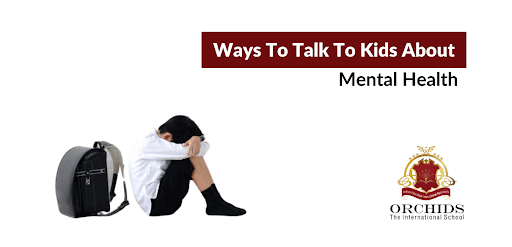How to Talk to Your Kids About Mental Health
By Mautushi Paul |
Date 09-08-2024

Table of Contents
Admissions Open for
Introduction
Parents are always the first to know when something is wrong with their children. They notice changes in mood, health, or personality long before anyone else does. Sadly, it’s not uncommon for these changes to be related to mental health issues like depression and anxiety. These health problems can go undiagnosed for years if parents don’t take the initiative to talk about them openly and honestly with their kids from an early age. In this blog post, we will discuss how you can learn more about your child’s mental health by asking open-ended questions and listening actively without judgment.
Importance of mental health for children
Mental health is important for everyone, including children. They can experience mental health problems as they grow up just like adults do. It’s scary and uncertain when your child has a problem that you can’t fix or understand but there are many things you can say to help them in hard times. Here are some of the important points why mental is equally important for children:
It’s not just a phase they’re going through and it won’t get better on its own.
They need to know that mental health is something you can do anything about, instead of assuming nothing will make any difference or trying to cope with the problem alone.
To be helped is the best solution
The earlier someone gets help for their mental health, the best are the results for his better upbringing and development.
Mental health is important for kids
A lot of people think that mental health is not important for children, but the opposite is true. Mental health can be just as difficult and troubling for a child as it can be for an adult, if not more so because they have to cope with their emotions without any experience or knowledge on how to do this.
Online world is another aspect you should take care of
The online world is another aspect people need to look into. Children are spending a lot of time on the internet, but this can be both beneficial and detrimental. The downside is that they might come across content that could trigger their mental-hygiene issues or make them feel worse about themselves. Parents need to find out where their children are at when it comes to social media use.
Tips to Talk to Your Kids About Mental Health
It can be hard and challenging to have a conversation with kids about health, but it is important to make the effort. When talking to your children about health issues such as mental-hygiene, you want them to feel that they can ask questions and get an honest answer from you without feeling judged or ashamed for what they are going through.
Talk about how you can start:
the first step in this conversation is making sure that we are asking questions and talking openly so that mental health isn’t seen as something disgusting or taboo from our kids’ point of view.
Talk about how the brain works:
starting a conversation about how the brain works. Explain what health means in our body and how it can affect the brain
Talk about mental health:
Explore with your kids what they think mental-hygiene is, why would someone need support for their mental health? What do you think happens to a person when they’re not well mentally? How can we help people who are having difficulties?
Validate their emotions and feelings:
address a lot of the emotions and feelings that your kids might be going through. Don’t tell them what to do or how they should feel, just validate their feelings
Talk about the stigma:
Talk about the stigmas associated with mental health in society
Encourage questions:
Always encourage more questions from your kids so you can continue this conversation as long and healthy as you can.
Confront the fearful part:
When a parent is trying to speak about mental-hygiene with their kids, one of the things that they might fear or worry about is how the child will react. They may be scared of what their kid’s response will be and if it’ll scare them away from this conversation for good. But just remember there are some ways you can confront these fearful parts.
Seek help when needed:
In case your child seems to be struggling with mental health, make sure you get them help before it becomes a problem.
Conclusion
It’s never too early to teach your children about mental-hygiene and how they can take care of themselves. Children are more aware than you think, so it may be best not to sugarcoat the truth when talking with them. Being honest is always better in this case because kids will likely hear information from other sources as well. You want them to know that their feelings are real and valid, while also teaching self-care strategies for dealing with those emotions effectively without shutting down completely or overcompensating by doing something harmful like cutting themselves. Parents who have been through a tough time can help guide their child on what helped during difficult times – whether it was drawing pictures, writing out thoughts, or anything else.
Also Read:
The importance of teaching children teamwork and sportsmanship
CBSE Schools In Popular Cities
- CBSE Schools in Bangalore
- CBSE Schools in Mumbai
- CBSE Schools in Pune
- CBSE Schools in Hyderabad
- CBSE Schools in Chennai
- CBSE Schools in Gurgaon
- CBSE Schools in Kolkata
- CBSE Schools in Indore
- CBSE Schools in Sonipat
- CBSE Schools in Delhi
- CBSE Schools in Rohtak
- CBSE Schools in Bhopal
- CBSE Schools in Aurangabad
- CBSE Schools in Jabalpur
- CBSE Schools in Jaipur
- CBSE Schools in Jodhpur
- CBSE Schools in Nagpur
- CBSE Schools in Ahmednagar
- CBSE School In Tumkur

Call Us to know more about Orchids
Swipe Up

















